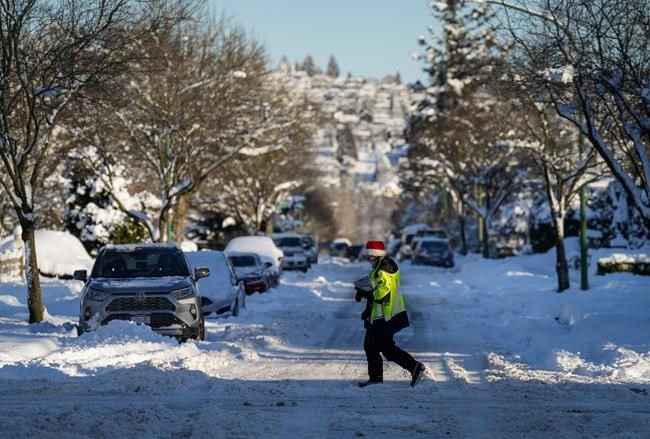VANCOUVER — Weather warnings or special weather statements are posted in every province and territory except Manitoba as winter storms or extreme cold usher in the official start of the season.
Environment Canada says wind chill values across all of Alberta and more than half of Saskatchewan will make it feel like minus 40 or colder, while some areas of northern Alberta, the Yukon and Northwest Territories will endure wind chill of minus 50.
The cold is expected to continue through this week and the weather office says 20 daily low temperature records were set in Alberta Tuesday, along with three in Yukon, including a record of -49.2 C in Watson Lake, breaking a mark set 67 years ago.
Brian Proctor, a meteorologist with Environment Canada based in Alberta, said the chilly temperatures will remain in the Prairies for a few more days until some warm air is pushed across the Rockies, bringing more seasonable temperatures.
"So really, we've probably got another day to two days of cold air on the Prairies and then we start to moderate things nicely for the Christmas season," he said.
Alberta's frigid temperatures this week prompted the province's electrical system operator to declare a grid alert.
The daytime high Wednesday was -32 C in Grande Prairie, -27 C in Edmonton and -25 C in Calgary with overnight wind chills of -40 C.
The Alberta Electric System Operator recorded a new all-time peak demand Monday but continued extreme cold, high demand and an unplanned outage has resulted in the alert.
The body is preparing to use emergency reserves to meet demand and is asking consumers to reduce electricity use or face rolling brownouts.
The arctic front pushing frigid air south also extends over British Columbia, where most of the province is shivering under extreme cold or arctic outflow warnings as a high-pressure system shoots icy air from the Interior outward to the coast.
More than a dozen daily minimum temperature records were set Tuesday in B.C., including -47 C west of Williams Lake, while the arctic outflows were numbing usually balmy areas such as Victoria and Metro Vancouver where wind chill values were forecast to reach -20 C.
BC Housing opened emergency warming centres in communities across the province as concern grew that the extreme conditions could be deadly for the province's vulnerable residents.
The City of Vancouver plans to keep additional shelter spaces open through Thursday at more than a dozen locations.
Nicole Mucci with the Union Gospel Mission, which advocates for the homeless in Vancouver, said deaths have occurred in each year that the city has had a major snowfall or deep freeze as homeless residents use candles or space heaters to stay warm.
"That is something that concerns us deeply," Mucci said.
"Nobody should have to choose between potentially freezing to death or putting their life at risk to stay warm."
Face-to-face exams were cancelled for a second day in a row at the University of Victoria.
The University of B.C., Simon Fraser University and the B.C. Institute of Technology were operating as scheduled Wednesday after cancelling in-person exams on Tuesday.
In Ontario, Environment Canada issued special weather statements for the entire southern half of the province and parts of the north ahead of a storm expected later this week.
It said southern Ontario was expected to see rain or snow late Thursday that could transition to rain in many areas early Friday, after which temperatures are expected to plunge, leading to a potential flash freeze.
Blizzard conditions are possible late Friday into the weekend for areas downwind of Lake Huron and Georgian Bay in southern Ontario.
In northern Ontario, snowfall is expected to begin Thursday in areas near Lake Superior and will reach James Bay on Friday.
Much of Quebec is covered in either a winter storm warning or watch.
Environment Canada says a major weather system will reach the province Thursday evening bringing with it significant snowfall, very strong winds and blowing snow.
Between 15 and 30 centimetres of snow are expected Thursday night and into Friday morning. By end of day Friday, as much as 40 centimetres of snow may have accumulated in some locations.
Areas near the St. Lawrence River will receive less snow but precipitation will change to rain, making freezing rain a possibility in that area Thursday night and Friday morning.
Drivers are being asked to consider postponing non-essential travel until conditions improve.
— with files from Bill Graveland and Brenna Owen
This report by The Canadian Press was first published Dec. 21, 2022.
Ashley Joannou, The Canadian Press



